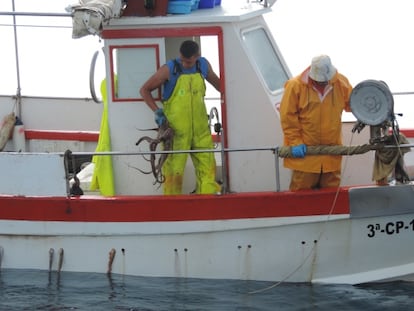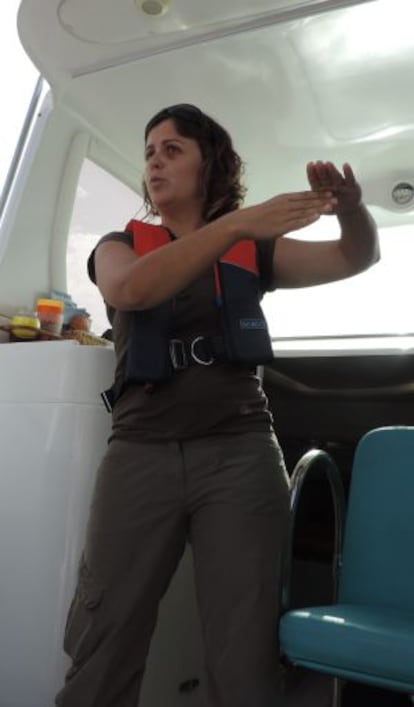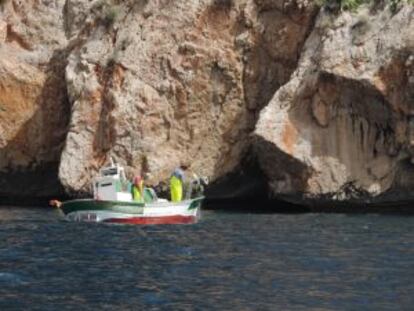Alicante octopus catchers set their nets for tourists
Tour firm, town hall and fishermen are teaming up to preserve traditional techniques in Altea

The fisherman’s boot came crashing down on the octopus as it wriggled on the deck. Then an expert hand tossed it in the back of the boat and moved on to the next trap.
There was a brief silence on the tourist boat observing the scene just a few meters away.
“They would scurry away if he didn’t do that,” explained Rebeca Velasco, the tour guide.
Velasco is a marine biologist who runs a new sustainable tourism project in Altea (Alicante) along with her partner Daniel Gilabert.
In a pioneering venture for the area, they have partnered with local fishermen who still use traditional techniques to showcase their artisan work.
Working out of small boats near the coast, the fishermen catch octopus with cadufos, traps spaced out along an underwater line. They also use the trasmallo, a three-net combination used to capture bottom-dwelling fish and crustaceans.
“Right now there are just six traditional fishing boats in operation here,” notes Velasco, whose up-close-and-personal fishing tour is promoted by local authorities through the local tourism office.

Life after the property crash
For this seaside town where fishing still feeds dozens of families, the project represents a dual effort to both support the community and stimulate tourism, one of the few reliable areas of the Spanish economy following the property crash.
“Our job was basically to facilitate contacts between the Cofradía de Pescadores [the fishermen’s association] and small boating companies to make this possible,” says Miguel Ángel Capilla, the city councilor in charge of fishing and agricultural affairs. The city pays fishing boats an allowance of around €50 for the extra time they spend at sea showing tourists their trade.
Velasco and Gilabert’s boat ride company, Rutes de Mar, was the first to join the project, but authorities are hoping more will follow suit.
“It would be nice if a company showed up and said they had enough clients to make trips on a daily basis,” says Capilla. “Of course then we might not be able to afford the allowance any more, but it would be worth it for the support it would bring to a traditional, sustainable activity.”
The trasmalleros, he points out, “are authorized to work within the waters of a natural park.”
The preserve he is referring to is the Serra Gelada Natural Park, where Velasco and Gilabert, both 37, used to work before losing their jobs to the economic crisis last year. For them, the fishing tours are also a way to boost their newly created business.
“When you have a regular job you daydream about the things you would do if you were your own boss,” says Gilabert, a boat skipper and professional diver. “Now, the crisis has forced us to make those dreams a reality.”
In February of this year they started their own small boating company, which takes passengers on a guided tour of Altea Bay. Besides tagging behind the fishing boats, the trip includes close-up views of the two fish factories that operate here, where dolphins are regularly seen feeding off the fish that come looking for leftovers.

Night fishing on the rocks
There were times when life around here was even harder, crisis or no crisis. As Gilabert steers the vessel close to the limestone walls of Morro Toix, on the northern end of the bay, he points at long, narrow ladders leading down to crumbling platforms just above sea level. Peasants used to spend the day working the land, then come here at night and climb down the vertical rockface in their rope-soled espadrilles to see what they could catch over the next few hours.
“They must have had great courage,” muses one of the passengers.
“Yeah, or great need,” replies Gilabert.
This type of fishing disappeared in the 1960s, but some artisan methods remain. Back on the Poalet, the octopus boat, two young fishermen check trap after trap and answer the questions flying out at them.
“This one goes back in!” the skipper calls out as he drops a small-sized octopus into the water again. The cut-off point is one kilo, he explains – anything below that is off limits. The season runs from December 15 through July 15; for the rest of the year there is a province-wide ban on artisan octopus fishing, to let the species recover.
The lack of job prospects has forced many Spaniards into a new life as entrepreneurs
On this particular day, the skipper said he expected to catch something in the range of 60 kilos, while other days they come home empty-handed. A kilo of octopus fetches €5 on the local fish exchange, the Lonja, where it gets sold to local restaurants.
Altea is not the only coastal town to embrace a brand of marine tourism that offers passengers an insight into fishing methods. Galicia and Andalusia, two regions with a powerful fishing tradition, offer similar day trips. But the concept is still getting underway along the Alicante coast.
Councilor Capilla reports that the Altea tourism office receives up to a dozen calls a day asking about the fishing tours. Velasco and Gilabert are happy to hear about the growing interest, but remain aware of the challenges ahead. Like so many others in a country with 25-percent unemployment, the lack of job prospects has forced them into a new kind of life that affords them greater personal freedom but considerably less security.
“We have gone from one extreme to the other,” notes Velasco. “Now, every day, whatever it is you’re doing, you’re constantly thinking of ways to improve the business. We have opted for insecurity but also for the excitement of doing something that we really enjoy.”
Tu suscripción se está usando en otro dispositivo
¿Quieres añadir otro usuario a tu suscripción?
Si continúas leyendo en este dispositivo, no se podrá leer en el otro.
FlechaTu suscripción se está usando en otro dispositivo y solo puedes acceder a EL PAÍS desde un dispositivo a la vez.
Si quieres compartir tu cuenta, cambia tu suscripción a la modalidad Premium, así podrás añadir otro usuario. Cada uno accederá con su propia cuenta de email, lo que os permitirá personalizar vuestra experiencia en EL PAÍS.
¿Tienes una suscripción de empresa? Accede aquí para contratar más cuentas.
En el caso de no saber quién está usando tu cuenta, te recomendamos cambiar tu contraseña aquí.
Si decides continuar compartiendo tu cuenta, este mensaje se mostrará en tu dispositivo y en el de la otra persona que está usando tu cuenta de forma indefinida, afectando a tu experiencia de lectura. Puedes consultar aquí los términos y condiciones de la suscripción digital.








































